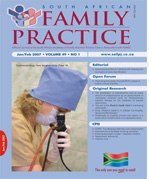Equal Opportunities For Children With Hearing Loss By Means Of Early Identification
Keywords:
Infant hearing loss, Early identification, Early intervention
Abstract
Infant hearing loss is a silent, overlooked epidemic of developing countries because its invisible nature prevents detection by means of routine clinical procedures despite being the most common birth defect. Even though it is not a life-threatening condition, failure to intervene in time renders it a severe threat to critical quality of life indicators such as education, employment and societal integration. This stands in stark contrast to current evidence which indicate early identification for infants with hearing loss followed by subsequent intervention leads to linguistic, speech and cognitive development that is comparable to normal hearing peers. Unfortunately initial detection of hearing loss in South Africa is primarily passive, when critical periods have passed, as a result of parental concern about observed speech and language delays, unusual behaviour or the complications of otitis media. Although the South African governmental policy guidelines favour the philosophy of screening for hearing loss in infants the implementation is not realised. Widespread newborn and infant hearing screening programmes must be established to ensure equal opportunities for children with hearing loss in South Africa.
Published
2007-02-07
Section
Editorials
By submitting manuscripts to SAFP, authors of original articles are assigning copyright to the South African Academy of Family Physicians. Copyright of review articles are assigned to the Publisher, Medpharm Publications (Pty) Ltd, unless otherwise specified. Authors may use their own work after publication without written permission, provided they acknowledge the original source. Individuals and academic institutions may freely copy and distribute articles published in SAFP for educational and research purposes without obtaining permission.

